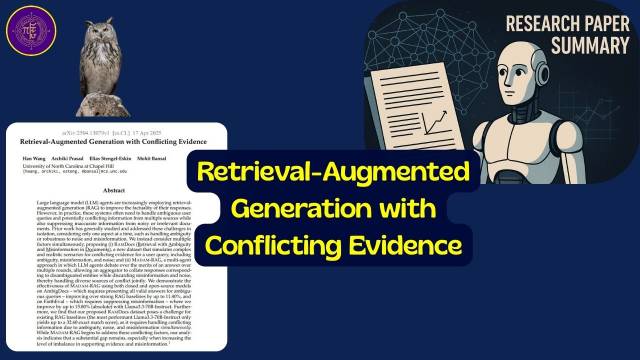
Paper Summary: Retrieval-Augmented Generation with Conflicting Evidence #
The hypothesis of this paper is that real-world retrieval-augmented generation (RAG) systems must simultaneously handle various sources of conflicting information, including ambiguity in user queries and contradictory information arising from misinformation and noise in retrieved documents. The authors argue that prior work has largely addressed these challenges in isolation.
Key learnings from this paper include: #
- Real-world RAG encounters a complex interplay of ambiguity, misinformation, and noise in retrieved documents.
- Existing RAG evaluation benchmarks and methods often focus on individual aspects of conflict, such as ambiguity or misinformation, but do not adequately address their simultaneous occurrence.
- Different types of conflict necessitate different handling strategies. Ambiguous queries might require presenting multiple valid answers, while misinformation and noise should be filtered out.
- The newly introduced RAMDocs dataset, designed to simulate these complex real-world scenarios, poses a significant challenge for current RAG baselines, including strong LLMs. Even the best-performing baseline on RAMDocs achieved a relatively low exact match score.
- The proposed MADAM-RAG framework, which employs a multi-agent debate mechanism, demonstrates effectiveness in jointly handling diverse sources of conflict, showing improvements over strong RAG baselines on AmbigDocs (handling ambiguity) and FaithEval (suppressing misinformation).
- Ablation studies on MADAM-RAG highlight the importance of both the aggregator module and the multi-round debate process in achieving its performance gains.
- The paper finds that imbalances in the number of supporting documents for different valid answers can lead to standard RAG systems favoring the more frequently supported answer.
- Increasing the level of misinformation in retrieved documents negatively impacts the performance of RAG systems, even strong LLMs. MADAM-RAG shows more resilience to this compared to baselines.
The new methods suggested in this paper are: #
- RAMDocs (Retrieval with Ambiguity and Misinformation in Documents): This is a novel dataset specifically constructed to evaluate RAG systems’ ability to handle conflicting information arising from ambiguity, misinformation, and noise simultaneously. It also features variability in the number of documents supporting different valid answers.
- MADAM-RAG (Multi-agent Debate for Ambiguity and Misinformation in RAG): This is a new multi-agent framework designed to address the challenges posed by RAMDocs. In MADAM-RAG:
- Each retrieved document is assigned to an independent LLM agent that generates an initial response based solely on its assigned document.
- These agents then engage in a multi-round debate, where they can revise their answers based on a summary of the previous round’s responses provided by a centralized aggregator module.
- The aggregator module synthesizes a final response from the agent discussions, aiming to present all valid answers for ambiguous queries while discarding misinformation and noise.
The final output of this paper includes: #
- The introduction of the RAMDocs dataset, which serves as a challenging benchmark for evaluating RAG systems under realistic conditions of conflicting information. The dataset statistics, highlighting the average number of valid answers and the distribution of supporting, misinformation, and noisy documents, are provided.
- The proposal and empirical evaluation of the MADAM-RAG framework. The results demonstrate that MADAM-RAG outperforms several strong RAG baselines (No RAG, Concatenated-prompt, and Astute RAG) on FaithEval (misinformation), AmbigDocs (ambiguity), and the new RAMDocs dataset.
- Detailed ablation studies that highlight the contribution of the aggregator and the multi-round debate mechanism to MADAM-RAG’s performance.
- Analysis of the impact of varying the number of supporting documents for correct answers and the impact of increasing levels of misinformation on the performance of different RAG systems, including MADAM-RAG.
- The paper concludes by acknowledging that while MADAM-RAG shows promise, RAMDocs remains a challenging task, indicating room for future improvements in handling complex conflicting information in RAG systems.


Comments: